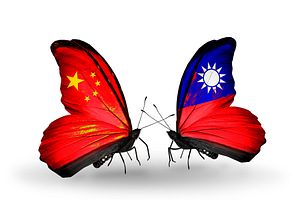After the bombshell revelation yesterday that the presidents of China and Taiwan would meet for the first time in history, there were a lot of unanswered questions about how the meeting would work. Finagling a meeting between two leaders who both claim to govern the same territory – according to the 1992 consensus, at least – is difficult in terms of logistics and protocol. After press conference by the bodies responsible for handling cross strait relations (the Taiwan Affairs Office in mainland China, and the Mainland Affairs Council in Taiwan), we have a clearer picture of how the meeting will work – and what it means for cross-strait relations.
The meeting will take place at the Shangri-La Hotel in Singapore on November 7. Presidents Xi Jinping and Ma Ying-jeou will be meeting as “leaders” of the two sides of the Taiwan Strait, and will address each other as “mister.” That allows China to avoid acknowledging Ma as a “president” (thus legitimizing the Republic of China government on Taiwan) while allowing Taiwan to avoid the embarrassment of having Ma only acknowledged in his personal capacity. TAO chief Zhang Zhijun said the two sides had made practical preparations “according to the one China principle.”
The two leaders will shake hands, deliver opening remarks before the press, then head off to closed door discussions. According to Zhang, Ma and Xi will “concentrate their energy on exchanging views on some important issues.” After the discussions, both sides will hold separate press conferences, then they will head to a banquet. Ma will depart Singapore immediately after the dinner.
To avoid perceptions that one side is hosting the other, the MAC clarified that Ma and Xi will split the cost for both dinner and the meeting venue. “It’s not about who will be whose guest at the dinner, but about having dinner together,” said MAC Deputy Minister Wu Mei-hung.
According to the MAC, Taiwan representatives first broached the idea of a meeting in Singapore after Beijing rejected the idea of a Ma-Xi meeting in Beijing during last year’s APEC summit. Hsia said he and Zhang agreed that it was time to set up such a meeting during their talks in Guangzhou in October.
Both TAO and MAC emphasized the historic and positive nature of the meeting. According to MAC Minister Hsia Li-yan, the goal is to “consolidate cross-strait peace and preserve status quo in the Taiwan Strait.” Zhang said the meeting would be helpful for building up mutual trust and handling difficult issues while continuing the development of cross-strait relations. It’s a “significant” and “positive” step, Zhang said.
However, Taipei also has to defend its flank from accusations from the opposition that Ma is ‘selling out’ Taiwan by meeting with Xi. During the MAC press conference, Hsia emphasized that the meeting will take place in accordance with Taiwan’s bottom line of equality and dignity. Ma will not sign any agreements or release any joint statements, and he will “firmly defend the country’s sovereignty and dignity,” Hsia said. In response to critics who questioned the transparency of the meeting, Hsia said the legislature will be briefed both before and after the Ma-Xi talks.
Hsia framed the meeting as a culmination of Ma’s administration’s efforts over the past seven years to institutionalize and normalize cross-strait dialogue. Cross-strait ties have seen several historic breakthroughs under Ma, from the signing of the Economic Cooperation Framework Agreement to an agreement to open official representative offices on each others’ soil. After all those efforts, “the time is ripe” for a Ma-Xi meeting, Hsia said.
Critics of the meeting, however, think the timing – two months out from Taiwan’s presidential and legislative elections – is suspicious. Democratic Progressive Party (DPP) chair and presidential candidate Tsai Ing-wen accused the ruling Kuomintang (KMT) of trying to “to politically manipulate cross-strait issues ahead of elections.”
“Now is a sensitive period of time as election campaigns are underway in Taiwan, and the public would definitely question whether [the president] is intending to influence the election result by holding a Ma-Xi meeting,” she said. Tsai has a strong lead in the most recent polls over KMT candidate Eric Chu.
Tsai also questioned whether such a meeting is appropriate, given that Ma’s term is about to end and that public opinion is divided on the merits of his administration’s cross-strait approach (as demonstrated by the 2014 Sunflower Movement). In response to the charge that there is no popular support for such a meeting, Hsia said that “an internal survey conducted by the [Mainland Affairs] Council showed about 80 percent of respondents favored a meeting between cross-strait leaders that is held with equality, dignity, and transparency.”
While the KMT has refuted charges that the Ma-Xi meeting is an attempt to shore up support before the election, there’s little doubt that Beijing wants to use the meeting to showcase its vision for cross-strait relations. One of the points of the meeting, according to Zheng, is to solidify the 1992 consensus as the “common political foundation” of the relationship. The 1992 consensus, in which both sides agreed there is one China, while remaining ambiguous on which government represents “China,” has never been accepted by the DPP. Beijing had repeatedly painted acceptance of the 1992 consensus as its bottom line for cross-strait relations, and will look to use the Ma-Xi meeting to drive that point home.
Zhang also took a more overt swipe at the DPP, saying that years ago, when the cross-strait relationship was “on the verge of a crisis” thanks to the “provocations of ‘Taiwan independence’ splittist forces,” a meeting of the top leaders from both sides would have been hard to imagine. Zhang was referring to is the cross-strait tensions that came under the leadership of the only DPP president to date, Chen Shui-bian.
































